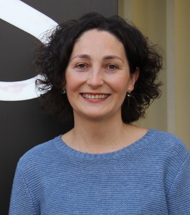2018_11_22_ICS_carmen-llamas
"There are parties that, without being populist, in elections tend to speech populist: more simplified and emotional, and with short term solutions deadline"
The University of Navarra hosts an international congress on political speech and citizen representation

PHOTO: Elena Beltrán
"There are parties that, without being populist, in the elections tend to speech populist: more simplified, with brief solutions and more emotional". This was explained by Carmen Llamas, a researcher at the University of Navarra, at the framework of an international congress promoted by the Institute for Culture and Society (ICS) of the University of Navarra.
"In these times, the need to reach out to citizens and convince them to voteis accentuated," Llamas explains. Especially in new parties or in existing ones with new leaders "as is the case of the PP and PSOE", she points out. From agreement with the expert, they try to persuade citizens to change their minds, especially to promote the vote of the undecided.
It is important, in his opinion, to differentiate between the primaryspeech , which is properly political, from those generated in social networks. "Both are valid, but each has its place. Unfortunately in the electoral period they are so much alike, that sometimes they are confused." In addition, one of the problems that worries him about Twitter is that it promotes more emotional reactions.
Along these lines, the researcher argues, it is relevant that the media do not highlight statements on Twitter or other types of speech above the primary political one. In addition, she believes that the work of journalists is core topic because she considers that "they bring the political speech closer to citizens as well as all other narratives, in context".
Today's political speech : more changeable"Before it was much more rational and now it is much more expressive," Llamas explains. This sometimes gives citizens the feeling that they are always in a pre-election period, he says. "The fact that the speech is more emotional today allows it to be much more changeable as well." When there used to be a crisis status politicians would come up with a series of solutions, he emphasizes, and that is very difficult to change. However, today the speech is more emotional, critical, presenting how citizens feel, and that is "much more volatile".
As an example, Llamas mentions the speech that is pronounced in the face of cases of corruption in one's own party. In addition to the reasoning that it will not happen again, there is a tendency to point out a greater corruption in the other party than in their own, even if it is not really more serious.
Carmen Llamas is co-organizer together with Ruth Breeze of the international congress 'In the name of the people: representing the people in twenty-first century politics'. Among other topics, issues such as the nationalistspeech , the speech of violence in Europe against women politici ans, the speech of migration, thespeech populist in Europe and other countries such as Venezuela, etc. will be addressed. The activity is part of the project 'DEMOS' of the ICS, sponsored by the Ministry of Economics and Competitiveness and the European Regional Fund development .

